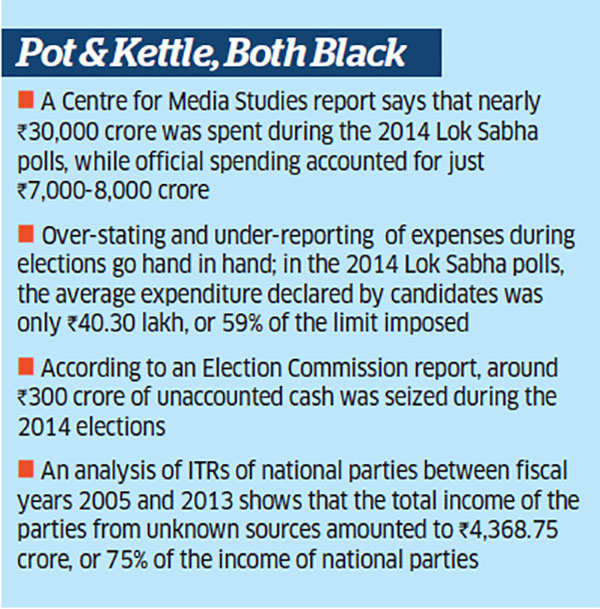Monetary losses and electoral gains can make political archenemies speak the same language. Equating the situation emerging out of the demonetisation drive to an “undeclared economic emergency”, BSP chief Mayawati said that the BJP move is motivated by selfish interests.
Her bête noire and SP supremo Mulayam Singh Yadav, too, termed the situation an emergency, and urged the PM to defer the plan “in the interest of the common man”. Clearly, the demonetisation drive has come as bad tidings for the BSP and the SP ahead of the crucial assembly elections in Uttar Pradesh. “The prime minister has taken the decision to improve his image, conveniently remaining oblivious to the discomfort of the common man. Talking of black money, no prime minster of the country has ever worn as costly a suit as Narendra Modi has,” SP spokesperson Deepak Mishra told ET Magazine.
The timing of the demonetisation, ahead of poll season, is not lost on political observers who feel it is a landmark move towards electoral reforms. “Mayawati ought to read Article 365 to understand what an economic emergency is. Even if we ignore the economic benefits (of the ban), it is a big step towards electoral reforms,” says SK Dwivedi, professor, political science, Lucknow University. Assembly polls are due in Uttar Pradesh, Uttarakhand, Goa, Manipur and Punjab early next year.
In Punjab, meanwhile, political rivals are busy accusing the other of being a bigger black-money hoarder. The Badals of Shiromani Akali Dal (SAD), an ally of the BJP, are unperturbed. “We welcome the demonetisation move. These must be challenging times for the Congress wont to using black money during elections,” Punjab Deputy Chief Minister Sukhbir Singh Badal told ET Magazine. The counter: “People of Punjab are aware that the Akalis and the Badals have looted Punjab for the last 10 years. We believe that the Akalis stand to lose thousands of crores and the Aam Aadmi Party (AAP) hundreds of crores due to the drive,” Captain Amarinder Singh, Punjab Congress chief, told ET Magazine.
According to a study by Association for Democratic Reforms (ADR), the chances of winning for a crorepati candidate are 20% compared with 2% for a candidate with low assets. With old legal tender losing its value, political parties are back at the drawing board; and if insiders are to be believed, ticket aspirants in one party in UP, who were understood to have shelled out a hefty price, are being told to replace old money with either new currency or gold.

Union MoS for Finance Santosh Kumar Gangwar rubbishes any link between the upcoming polls and demonetisation. “It was a well-planned move by the prime minister. After giving ample time to disclose possession of black money, the prime minister made this announcement.
The reasons are not as much political as national and economic. But the problem of parties who sell tickets for crores in cash have increased manifolds,” Gangwar told ET Magazine.
Cash Landing
A report by the Centre for Media Studies says nearly Rs 30,000 crore was spent in the 2014 elections; the accounted spending totted up to just Rs 7,000- 8,000 crore.
The reasons are not as much political as national and economic. But the problem of parties who sell tickets for crores in cash have increased manifolds,” Gangwar told ET Magazine.
Jagdeep S Chhokar of the Association of Democratic Reforms (ADR) says while the focus has shifted to non-BJP parties, the fact that the BJP was aware of the decision gives it a certain advantage. “The possibility of the BJP having made an alternative arrangement can’t be ruled out. Others did not get the time as the rules of the games have changed. A level playing field seems to be missing.”
The Election Commission (EC), which has been on a drive to check the misuse of money during elections, has welcomed the move, though with a shelf life. “Definitely, it will help curb misuse of money during polls but only till the elections in the next few months. With time, parties and people will come up with a new modus operandi,” says former chief election commisioner SY Quraishi.
“The possibility of early distribution of crores of cash in smaller denominations among thousands of voters still exists — we must not remain oblivious to this possibility.”

